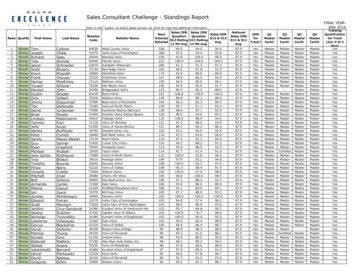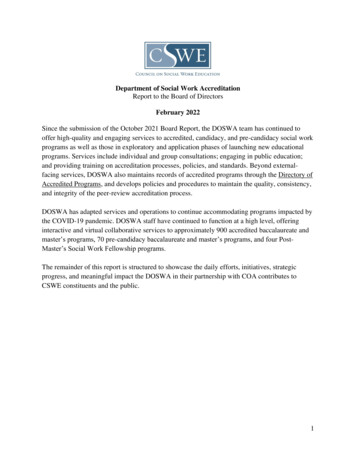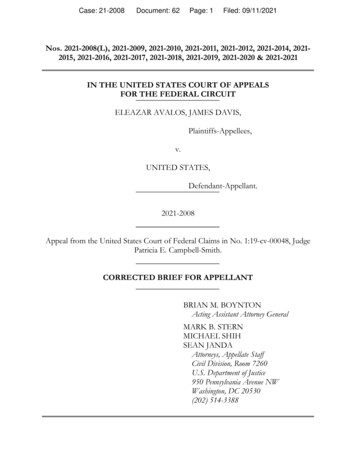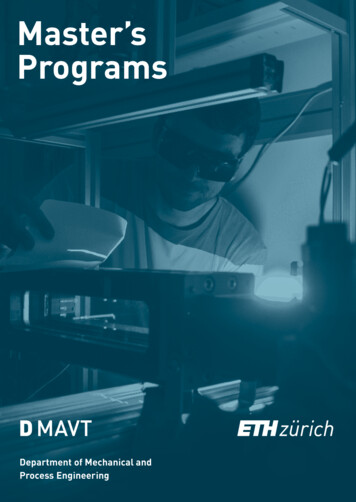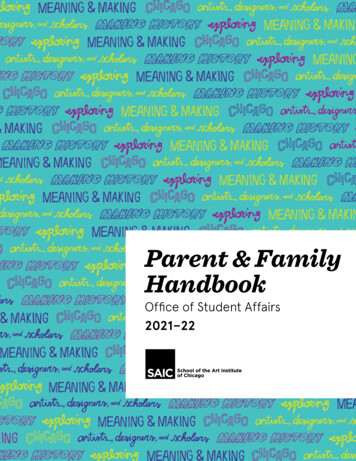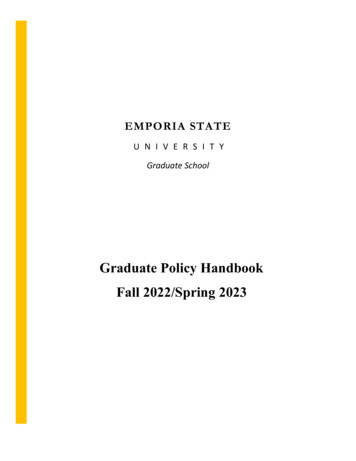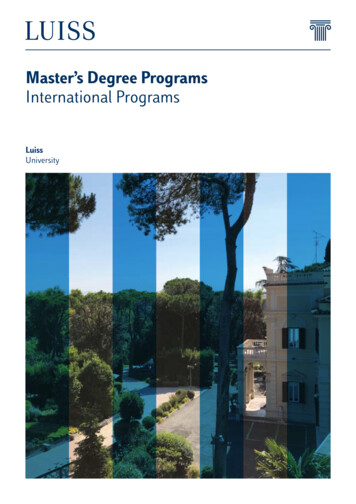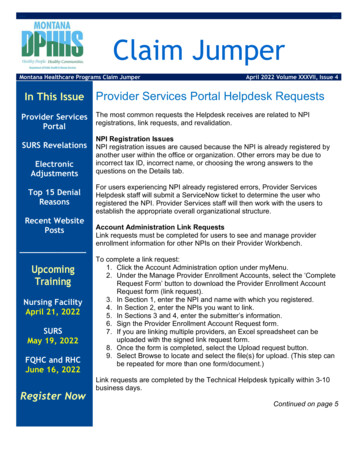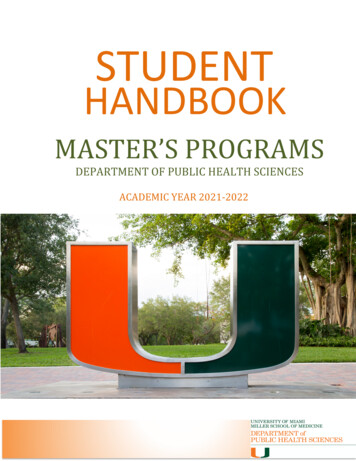
Transcription
STUDENTHANDBOOKMASTER’S PROGRAMSDEPARTMENT OF PUBLIC HEALTH SCIENCESACADEMIC YEAR 2021-20221rev. FALL 2020 (5/15)
Department of Public Health SciencesMaster’s Programs Student Handbook, 2021-2022Table of ContentsGRADUATE PROGRAMS IN PUBLIC HEALTH SCIENCES . 4GRADUATE PROGRAMS DEGREES . 4GRADUATE PROGRAMS MISSION . 4GRADUATE PROGRAMS VALUES . 4GRADUATE PROGRAMS GOALS AND OBJECTIVES . 5GRADUATE PROGRAMS GOVERNANCE AND COMMITTEE MEMBERSHIP . 5STUDENT RESPONSIBILITY. 6CODE OF ETHICS. 6PRE-ORIENTATION MODULES . 7PHOTOGRAPHY/VIDEO RELEASE. 7PLAGIARISM WORKSHOP . 7FACULTY ADVISORS FOR STUDENTS. 8GRADUATE SCHOOL POLICIES AND PROCEDURES . 9GRADUATE SCHOOL BULLETIN. 9TIME TO COMPLETION . 9LEVELS OF GRADUATE STUDY . 9CREDIT WAIVER FOR ADVANCED DEGREE STUDENTS . 10TRANSFER OF CREDIT FROM ACCREDITED GRADUATE INSTITUTIONS . 10CONTINUOUS ENROLLMENT . 11REGISTRATION. 11FULL-TIME STUDY . 11ENROLLMENT FOR INTERNATIONAL STUDENTS . 12WITHDRAWALS . 13MILITARY WITHDRAWAL . 13CREDIT HOUR FOR COURSES AFTER THE 12TH WEEK OF THE SEMESTER . 13LEAVE OF ABSENCE . 13GRADES AND CREDIT HOURS . 14REQUIRED GRADE POINT AVERAGE . 15AWARD OF ACADEMIC MERIT . 16CLASS ATTENDANCE AND PARTICIPATION . 16GRADUATE REPEAT RULE . 16APPLICATION TO JOINT DEGREE PROGRAMS . 16GRADUATE PROGRAMS PROCEDURES FOR APPEALS. 16GRADUATE SCHOOL GRADE APPEAL PROCESS. 17RA, TA, GA HOURLY GUIDELINES . 19GRADUATION/DEGREE CONFERRAL . 21COMMENCEMENT CEREMONY . 21GRIEVANCE GUIDELINES. 22INFORMATION TECHNOLOGY RESOURCES AT UM . 23CANELINK. 23BLACKBOARD (COURSE MANAGEMENT SYSTEM) . 23BLACKBOARD ONE-STOP SHOP. 23UNIVERSITY EMAIL . 23INFORMATION TECHNOLOGY DEPARTMENT . 24TUITION AND FEES . 26SCHOLARSHIP PROGRAMS AND FUNDING. 262rev. FALL 2021 (8/26/21)
Department of Public Health SciencesMaster’s Programs Student Handbook, 2021-2022GRADUATE CREDIT TUITION . 26COURSE ADD/DROP/WITHDRAWAL . 26INTERSESSION COURSES REFUND POLICY. 27GRADUATE STUDENT FEES . 27STUDENT HEALTH INSURANCE FEES . 28COURSE AUDITING FEE . 29EMPLOYEE TUITION REMISSION BENEFIT . 30UNIVERSITY-WIDE RESOURCES . 32OFFICE OF INTERNATIONAL STUDENT AND SCHOLAR SERVICES (ISSS) . 33OFFICE OF DISABILITY SERVICES . 33ACADEMIC ACCOMMODATIONS . 33WRITING CENTER . 35STUDENT HEALTH CENTER . 35STUDENT COUNSELING CENTER . 35MEDICAL CAMPUS RESOURCES . 37ACCESS CARD AND PHOTO ID. 37LIBRARIES. 37PARKING . 37METRORAIL PASSES . 38SECURITY . 38COMPUTER LABS . 38PUBLIC HEALTH STUDENT ASSOCIATION (PHSA) . 38DELTA OMEGA HONORARY SOCIETY FOR PUBLIC HEALTH . 39SOCIAL NETWORKING SITES . 40PUBLIC HEALTH DEGREE PROGRAMS . 41MASTER OF PUBLIC HEALTH (MPH) PROGRAM . 41MPH CAPSTONE PROGRAM (EPH 680 AND EPH 682) . 43MASTER OF SCIENCE IN PUBLIC HEALTH (MSPH) PROGRAM . 43MSPH PUBLIC HEALTH THESIS (EPH 698 AND EPH 699) . 444 1 PROGRAM - BSPH/MPH OR BSPH/MSPH . 44MASTER OF SCIENCE IN BIOSTATISTICS . 45MASTER OF SCIENCE IN PREVENTION SCIENCE AND COMMUNITY HEALTH . 46MASTER OF SCIENCE IN CLIMATE AND HEALTH . 47JOINT MEDICAL DOCTOR AND MASTER OF PUBLIC HEALTH (MD/MPH) . 48MD/MPH CAPSTONE PROGRAM & DEADLINES . 50JOINT JURIS DOCTOR AND MASTER OF PUBLIC HEALTH (JD/MPH) . 52JOINT MASTER OF PUBLIC ADMINISTRATION AND MASTER OF PUBLIC HEALTH (MPA/MPH) . 53JOINT MASTER OF ARTS IN INTERNATIONAL ADMINISTRATION AND MASTER OF PUBLIC HEALTH (MAIA/MPH) . 53JOINT MASTER OF ARTS IN LATIN AMERICAN STUDIES AND MASTER OF PUBLIC HEALTH (MLAS/MPH) . 54CONTACT INFORMATION . 55WHO’S WHO IN GRADUATE PROGRAMS . 55GRADUATE PROGRAMS ORGANIZATIONAL CHART . 57APPENDIX A: ACKNOWLEDGMENT OF RECEIPT AND REVIEW. 58APPENDIX B: ACKNOWLEDGMENT OF PLAGIARISM POLICY . 591. WHAT IS PLAGIARISM? HOW CAN STUDENTS AVOID PLAGIARISM? . 592. HOW TO USE SAFEASSIGN TO AVOID PLAGIARISM?. 593rev. FALL 2021 (8/26/21)
Department of Public Health SciencesMaster’s Programs Student Handbook, 2021-2022GRADUATE PROGRAMS IN PUBLIC HEALTH SCIENCESAll graduate work (except for law or medical degrees) at the University of Miami is under the direction ofthe Dean of the Graduate School and the Graduate Council.All graduate students at the University of Miami are subject to the general standards and requirements ofthe University and its various programs regarding attendance, examinations, payment of fees, andconduct, as well as to the specific requirements of the Graduate School. The graduate student is expectedto assume the initiative in completing all requirements in the time specified.Graduate Programs DegreesThe Department of Public Health Sciences offers master’s programs leading to the degrees of: Master of Public Health (MPH), Master of Science in Public Health (MSPH), Master of Science in Biostatistics (MS BST), Master of Science in Climate and Health (MS CH), and Master of Science in Prevention Science and Community Health (MS PSCH).Doctoral degree programs are offered in: Doctor of Philosophy (PhD) in Biostatistics, Doctor of Philosophy (PhD) in Epidemiology, and Doctor of Philosophy (PhD) in Prevention Science and Community HealthJoint degree programs are also offered in conjunction with the: School of Medicine (4-year MD/MPH, MD/PhD), School of Law (JD/MPH), College of Arts and Sciences (MPH/MPA, MPH/MALAS, MPH/MAIA), and School of Nursing (4 1 with BSPH/MPH or BSPH/MSPH).Graduate Programs MissionThe mission of the Graduate Programs in Public Health Sciences is to develop leaders who can generateand translate knowledge into policy and practice to promote health and prevent disease in humanpopulations.Graduate Programs ValuesThe values guiding the Graduate Programs in Public Health Sciences include: Physical and Mental Health and Well-Being: A fundamental right of every human being. Health Equity: A commitment to ensure the health of all populations, including the mostvulnerable and underserved.4rev. FALL 2021 (8/26/21)
Department of Public Health SciencesMaster’s Programs Student Handbook, 2021-2022 The Freedom of Inquiry: To think, to question and to challenge forms the basis for all oureducational, research, and service activities.Diversity, Inclusion and Mutual Respect: Promote and celebrate individual and collectivedistinctions among our students, staff, faculty, and community partners.Personal and Professional Integrity: Ethical behavior guides the activities of our students, staff,faculty, and community partnerships.Community and Organizational Partnerships: Participatory collaboration with diverse andfully engaged stakeholders to promote health and social change.Graduate Programs Goals and ObjectivesInstruction To provide engaging educational opportunities preparing leaders to maximize the health and wellbeing of individuals, communities, and populations. To mobilize a diverse student body to address complex public health issues, including issuesaffecting vulnerable and underserved populations. To nurture an inclusive environment in which students are supported as they attain the knowledge,competencies, and values of public health. To promote instructional innovation and faculty advancement in teaching.Scholarship To foster an environment in which students and faculty collaborate on rigorous scientificinvestigations addressing public health issues, with an emphasis on vulnerable and underservedpopulations.Service To engage with communities, professionals, leaders, and others as partners in improving the healthof populations, including the most vulnerable and underserved.Innovation To develop and maintain infrastructure, resources and technologies that are adequate to supportfaculty, staff, and students as they work to accomplish the mission of the public health program.Graduate Programs Governance and Committee MembershipThe Graduate Programs consist of several faculty and administrative committees that review all elementsof the master’s and doctoral programs. Committees include the Admissions Committee, the CurriculumCommittee, the Graduate Administration and Operations Committee (GAOC) and the Graduate ExecutivePolicy Committee (GEPC).The Admissions Committees are composed of select voting faculty members and are responsible forreviewing and voting on all graduate program applications for the MPH, MSPH, MS BST, MS CH, MSPSCH, and PhD programs in biostatistics, epidemiology, and prevention science.5rev. FALL 2021 (8/26/21)
Department of Public Health SciencesMaster’s Programs Student Handbook, 2021-2022The Curriculum Committee is composed of DPHS faculty, program administration staff, and 2 studentrepresentatives (master’s and doctorate level). The primary mission of the Curriculum Committee is towork cooperatively with faculty and students in its continuous efforts to improve and facilitate theteaching of public health, biostatistics, epidemiology, and related fields within the Department of PublicHealth Sciences, the University of Miami Miller School of Medicine, and the South Florida community.The Graduate Executive Policy Committee (GEPC) and the Graduate Administration and OperationsCommittee (GAOC) consist of select faculty members and program administration staff. The GEPCoversees policies, decisions, and procedures of the Admissions Committees, Curriculum Committee, andthe Graduate Programs’ operations.Student ResponsibilityAll graduate students at the University of Miami are subject to the general standards and requirements ofthe University and its various departments regarding attendance, examinations, payment of fees, andconduct, as well as to the specific requirements of the Graduate School. The graduate student is expectedto assume the initiative in completing all requirements at the time specified.To preserve its ideals of scholarship, conduct, and character, the Graduate School reserves the right andthe student by his/her registration concedes the right to require the withdrawal of any student for anyreason deemed sufficient by the Graduate School at any time.It is the responsibility of the student to be informed concerning all regulations and procedures required. Inno case will a regulation be waived, or an exception granted because a student pleads ignorance of theregulation or asserts that he/she was not informed of it by an advisor or other authority. The studentshould become familiar with the Academic Bulletin, including:1. The section presenting the requirements for the degree to be undertaken;2. The offerings and requirements of the major department;3. The Graduate Student Honor Code.After the applicant has been admitted to the Graduate School but before the first registration, the studentshould consult with the Director of Admissions concerning course requirements, deficiencies, if any, theplanning of a program or special regulations.All graduate students are required to sign the Acknowledgement of Receipt and Review Form(Appendix A) of the Master’s Programs Student Handbook which provides a web link to the GraduatePrograms in Public Health Student Handbook, the Graduate School Honor Code, and the AcademicBulletin.Code of EthicsThe Graduate Programs are committed to fostering an environment that supports the promotion of publichealth values and is conducive to professionalism and ethical standards for the responsible conduct ofscience and education. In addition to the values listed in this Master’s Programs Student Handbook,graduate students agree to abide by the Graduate Student Honor Code.6rev. FALL 2021 (8/26/21)
Department of Public Health SciencesMaster’s Programs Student Handbook, 2021-2022The University of Miami expects all graduate students to adhere to the highest standards of ethics andacademic integrity. All forms of academic fraud are strictly prohibited. These include but are not limitedto plagiarism and/or cheating (whether it be in an examination, dissertation, thesis, research paper,research project, form of creative expression, experimental data, or any other academic undertaking)submitted for evaluation, presentation, or publication meets these standards.Additionally, graduate students are expected to respect and appreciate the diversity of the community andto respect the rights of others, be they property, privacy, opinion, or expression. Students found to be inviolation of these standards are subject to disciplinary actions by the student’s program and/or theGraduate School through the process described in the Graduate Student Honor Code. All graduatestudents are bound by the rules and regulations of the University of Miami that apply to them.Pre-Orientation ModulesAll incoming master’s students will be required to complete a series of online modules found in theBlackboard Orientation page prior to beginning the master’s degree programs.Photography/Video ReleaseDuring the program, you may be photographed or video-taped at various University sponsored events.With your consent, the photograph or video may be released for use on the Department of Public HealthSciences’ webpage, social media pages, brochures, newsletter, or other media. These materials will beused primarily to highlight our Department’s student activities and successes. Please acknowledgeconsent of use of photography by signing the Acknowledgement of Receipt and Review Form(Appendix A).Plagiarism WorkshopPlagiarism is explicitly outlawed at the University of Miami Miller School of Medicine, and each studentwho enters our programs signs a statement acknowledging this fact. Students who are found to haveplagiarized may be asked to withdraw from their degree program. Plagiarism is not always easy to define;students who are unsure whether a particular practice is acceptable are urged to discuss the issue with thefaculty instructor or mentor.All incoming master’s students are required to sign the Acknowledgement of Plagiarism Policy Form(Appendix B) of this Master’s Programs Student Handbook which provides:All incoming master’s students will also be required to participate in a two-hour workshop on “UsingAMA and APA Citations Correctly to Avoid Plagiarism”. The workshop will be offered by theUM Calder Medical Library early in the Fall and Spring semesters to accommodate incoming students ineach semester. Students will be required to complete an assignment prior to attending the workshop. TheDirector of Academic Affairs will work with the incoming students to ensure completion of thisrequirement.7rev. FALL 2021 (8/26/21)
Department of Public Health SciencesMaster’s Programs Student Handbook, 2021-2022Faculty Advisors for StudentsAcademic Faculty Advising is a critical aspect of students’ learning and professional developmentexperience. It includes advising related to all the following: course selection and academic goals, thesis (for MS) or capstone (for MPH) program, and career and professional development.Students are required to meet with their assigned faculty advisor at a minimum: prior to entering the first semester in their program; once per semester, at the time of course selection for the subsequent semester; prior to beginning thesis or capstone; and prior to graduation.Once MPH students advance to the Capstone Program and MS students advance to the Public HealthThesis Project, they are required to work closely with their assigned Faculty Advisor and the AssociateDirector of Career and Professional Development to ensure that they adequately meet therequirements. Before embarking on a capstone or thesis project, students will be assigned to a FacultyAdvisor based on their area of interest (Biostatistics, Environmental Health, Epidemiology, HealthServices Research and Policy, Prevention Sciences or MD/MPH). The Faculty Advisor will help studentsdevelop learning objectives, discuss public health significance of the project, and determine appropriatescope of work. All advising will be formally documented in the student’s program plan. Students will berequired to upload all documents related to the Capstone Program and Thesis Project to the course’sBlackboard page.8rev. FALL 2021 (8/26/21)
Department of Public Health SciencesMaster’s Programs Student Handbook, 2021-2022GRADUATE SCHOOL POLICIES AND PROCEDURESGraduate School BulletinStudents (at the time of their new student orientation) are provided a web link to the Academic Bulletinand are required to sign the acknowledgement and receipt form (Appendix A). The Academic Bulletin ispublished annually and contains the policies of the Graduate School, descriptions of courses offered, andthe services that are available to graduate students. Students are responsible for knowledge on general UMpolicies and procedures outlined in the Academic Bulletin. Additional Graduate Programs in PublicHealth Sciences specific policies and procedures are outlined in this Master’s Programs StudentHandbook.All graduate students at the University of Miami are subject to the general standards and requirements ofthe University and its various programs regarding attendance, examinations, payment of fees, andconduct, as well as to the specific requirements of the Graduate School. The graduate student is expectedto assume the initiative in completing all requirements in the time specified.Time to CompletionTime to completion starts when a student begins any program in the Graduate School, whether it be amaster’s or doctoral program. All work must be completed within six y
College of Arts and Sciences (MPH/MPA, MPH/MALAS, MPH/MAIA), and School of Nursing (4 1 with BSPH/MPH or BSPH/MSPH). Graduate Programs Mission The mission of the Graduate Programs in Public Health Sciences is to develop leaders who can generate and translate knowledge into policy and practice to promote health and prevent disease in human

